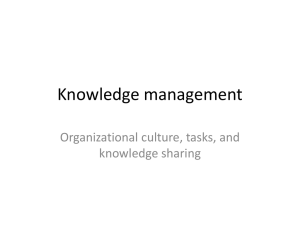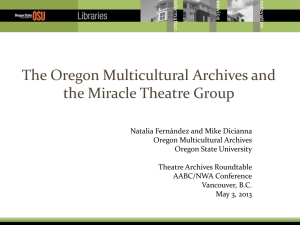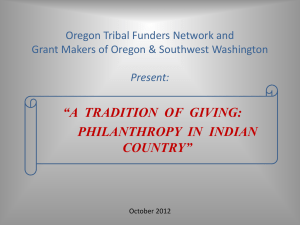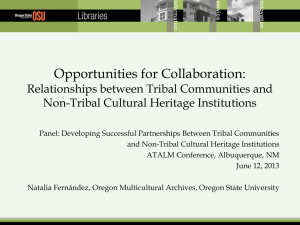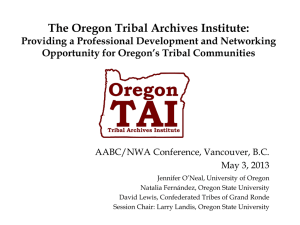Oregon Tribal Archives and Records Management Institute
advertisement
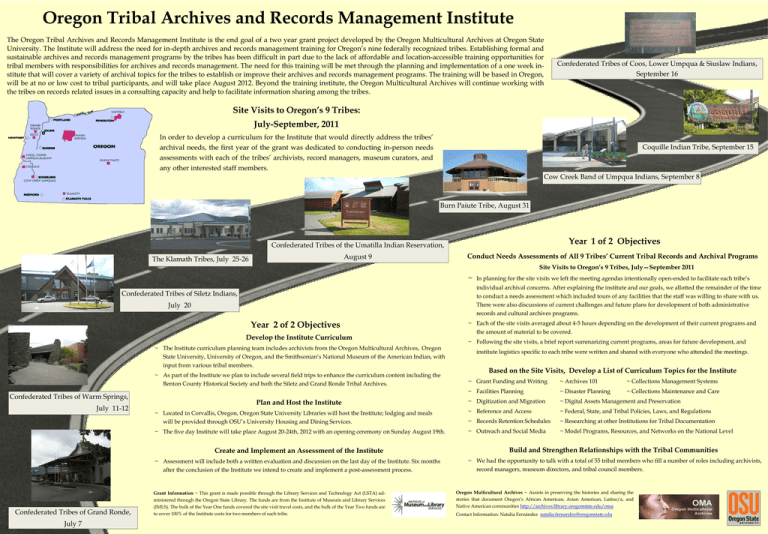
Oregon Tribal Archives and Records Management Institute The Oregon Tribal Archives and Records Management Institute is the end goal of a two year grant project developed by the Oregon Multicultural Archives at Oregon State University. The Institute will address the need for in-depth archives and records management training for Oregon’s nine federally recognized tribes. Establishing formal and sustainable archives and records management programs by the tribes has been difficult in part due to the lack of affordable and location-accessible training opportunities for tribal members with responsibilities for archives and records management. The need for this training will be met through the planning and implementation of a one week institute that will cover a variety of archival topics for the tribes to establish or improve their archives and records management programs. The training will be based in Oregon, will be at no or low cost to tribal participants, and will take place August 2012. Beyond the training institute, the Oregon Multicultural Archives will continue working with the tribes on records related issues in a consulting capacity and help to facilitate information sharing among the tribes. Confederated Tribes of Coos, Lower Umpqua & Siuslaw Indians, September 16 Site Visits to Oregon’s 9 Tribes: July-September, 2011 In order to develop a curriculum for the Institute that would directly address the tribes’ archival needs, the first year of the grant was dedicated to conducting in-person needs assessments with each of the tribes’ archivists, record managers, museum curators, and any other interested staff members. Coquille Indian Tribe, September 15 Cow Creek Band of Umpqua Indians, September 8 Burn Paiute Tribe, August 31 Confederated Tribes of the Umatilla Indian Reservation, Year 1 of 2 Objectives August 9 Conduct Needs Assessments of All 9 Tribes’ Current Tribal Records and Archival Programs The Klamath Tribes, July 25-26 Site Visits to Oregon’s 9 Tribes, July—September 2011 ~ In planning for the site visits we left the meeting agendas intentionally open-ended to facilitate each tribe’s individual archival concerns. After explaining the institute and our goals, we allotted the remainder of the time to conduct a needs assessment which included tours of any facilities that the staff was willing to share with us. There were also discussions of current challenges and future plans for development of both administrative records and cultural archives programs. Confederated Tribes of Siletz Indians, July 20 Year 2 of 2 Objectives Develop the Institute Curriculum ~ The Institute curriculum planning team includes archivists from the Oregon Multicultural Archives, Oregon State University, University of Oregon, and the Smithsonian’s National Museum of the American Indian, with input from various tribal members. ~ As part of the Institute we plan to include several field trips to enhance the curriculum content including the Benton County Historical Society and both the Siletz and Grand Ronde Tribal Archives. Confederated Tribes of Warm Springs, July 11-12 Confederated Tribes of Grand Ronde, July 7 ~ Each of the site visits averaged about 4-5 hours depending on the development of their current programs and the amount of material to be covered. ~ Following the site visits, a brief report summarizing current programs, areas for future development, and institute logistics specific to each tribe were written and shared with everyone who attended the meetings. Based on the Site Visits, Develop a List of Curriculum Topics for the Institute ~ Grant Funding and Writing ~ Archives 101 ~ Collections Management Systems ~ Facilities Planning ~ Disaster Planning ~ Collections Maintenance and Care ~ Digitization and Migration ~ Digital Assets Management and Preservation ~ Located in Corvallis, Oregon, Oregon State University Libraries will host the Institute; lodging and meals will be provided through OSU’s University Housing and Dining Services. ~ Reference and Access ~ Federal, State, and Tribal Policies, Laws, and Regulations ~ Records Retention Schedules ~ Researching at other Institutions for Tribal Documentation ~ The five day Institute will take place August 20-24th, 2012 with an opening ceremony on Sunday August 19th. ~ Outreach and Social Media ~ Model Programs, Resources, and Networks on the National Level Plan and Host the Institute Create and Implement an Assessment of the Institute Build and Strengthen Relationships with the Tribal Communities ~ Assessment will include both a written evaluation and discussion on the last day of the Institute. Six months after the conclusion of the Institute we intend to create and implement a post-assessment process. ~ We had the opportunity to talk with a total of 55 tribal members who fill a number of roles including archivists, record managers, museum directors, and tribal council members. Grant Information ~ This grant is made possible through the Library Services and Technology Act (LSTA) administered through the Oregon State Library. The funds are from the Institute of Museum and Library Services (IMLS). The bulk of the Year One funds covered the site visit travel costs, and the bulk of the Year Two funds are to cover 100% of the Institute costs for two members of each tribe. Oregon Multicultural Archives ~ Assists in preserving the histories and sharing the stories that document Oregon’s African American, Asian American, Latino/a, and Native American communities http://archives.library.oregonstate.edu/oma Contact Information: Natalia Fernández natalia.fernandez@oregonstate.edu
